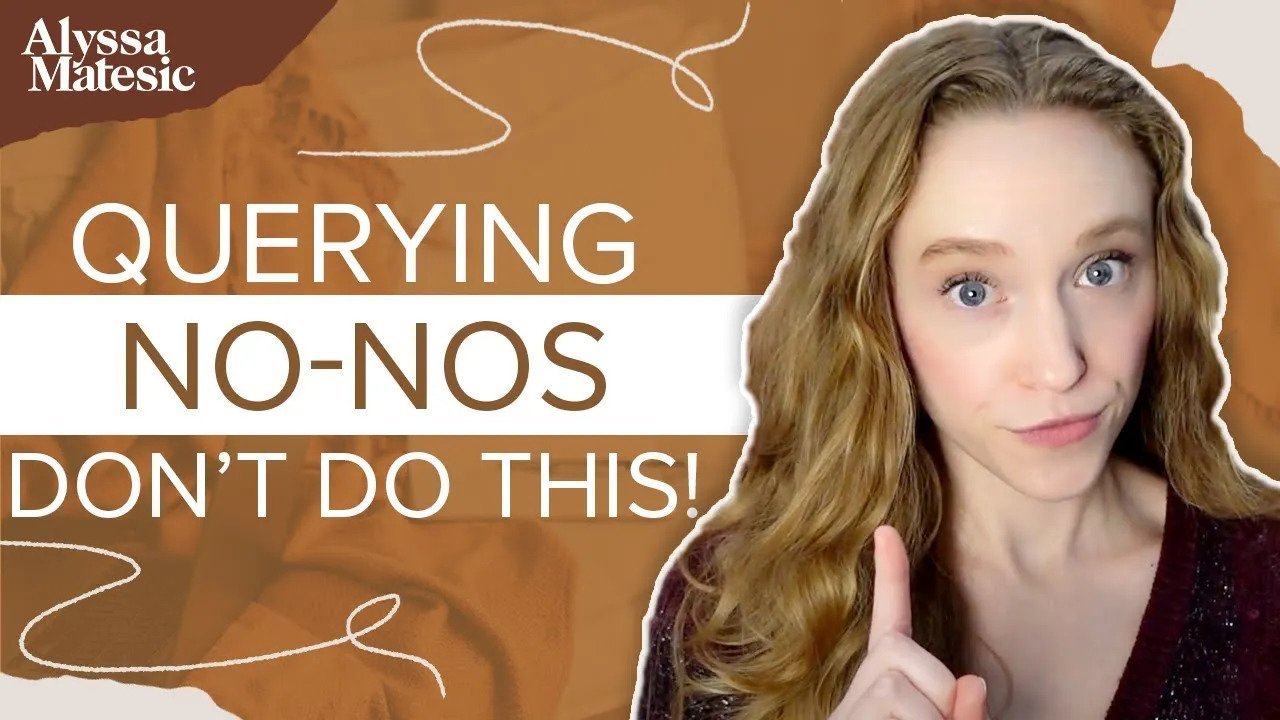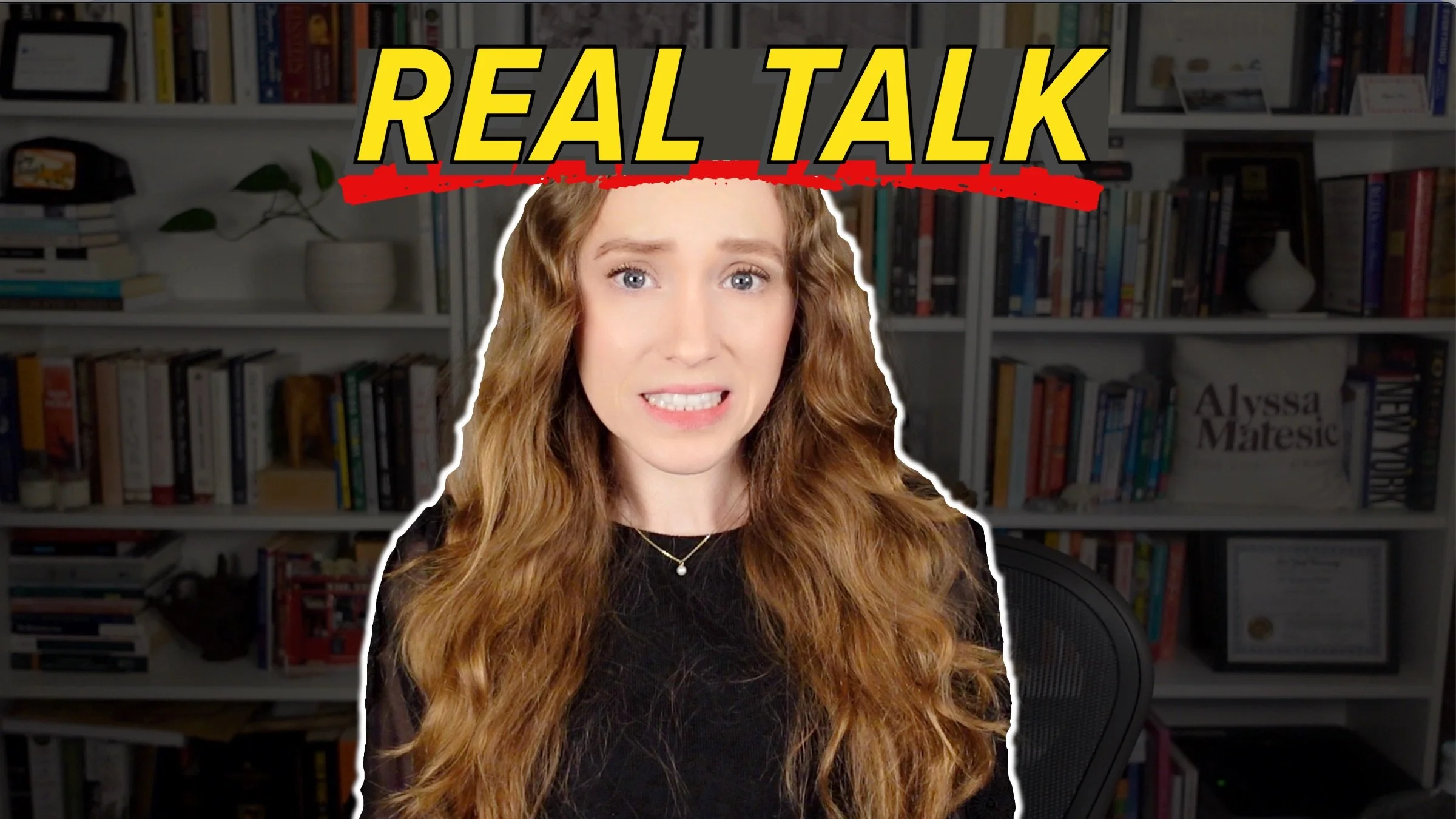5 Query Letter Don’ts That Will Lead to Instant Rejection
HIT PLAY OR READ THE POST BELOW:
If you're currently querying, you might be wondering if there are any shortcuts you can take or unorthodox methods of engaging a literary agent that might increase your odds of getting a positive response. I totally understand the thinking behind this — querying can be a long and grueling process. It can be discouraging and disheartening, so you want to think about other creative ways to get through the traditional publishing funnel — but, unfortunately, in the majority of cases, these tactics can actually do the opposite and end up turning off literary agents and leading to rejection.
So, today I want to talk about some query letter “don’ts” or faux pas that I have seen from working in the industry and explain why they are not the best method for catching an agent's attention.
1. Messaging Agents on Social Media
For organizational purposes, agents try really hard to keep all of their queries in one place so they can track them and understand where they are in their queue. Messaging them on Twitter, LinkedIn or Instagram to send them your query letter or manuscript is really not a good method of trying to reach out to them.
It is true that agents are typically very active on social media, so that might make you feel like they are open to this type of direct communication, but you need to go through whatever their specific query process is, which you can always find listed on their website. Every agent has specific submission instructions that you will want to follow to a T.
I also don't recommend asking literary agents questions or asking for advice via social platforms because they really don't have time to engage with authors who are not their clients. The one exception to the social media rule would be if a literary agent reaches out to you via a pitching event and it makes sense to reply in the messaging thread. In that case, it's totally fine to engage with them in whatever way they reached out to you, but still be sure to follow any instructions they give you.
If they initiate the conversation, you can feel free to go ahead, but you should not be initiating any conversations on social platforms with literary agents. Also, it's just an unprofessional thing to do. I know the lines are blurring between personal and professional life more and more these days, but the most professional way to query them or contact them is to go through their specific submissions process.
2. Re-querying Agents
The next query letter don’t that I saw a lot in the industry is re-querying the same agent. You might be in a position where you queried a literary agent six months or a year or even more than a year ago with a book project, and now that book project still doesn't have representation and you still haven't published it, so you want to reach back out to that agent again and see if they've changed their mind. This is not best practice because the agent's decision on your book should be taken as final.
Remember that the agent can quite easily search their query history and see that you queried them before already with the same book, and that is not going to look good on you. This rule applies even if you have revised the manuscript since you last queried them. As long as it is still very much the same book, you need to take their rejection as final.
The one exception would be if a literary agent has specifically asked you for a revise and resubmit, which is an invitation to resubmit to them if you revise the manuscript significantly. Usually, they give you specific feedback points that they would like you to address, and in that case, of course you can re-query them. But otherwise, unfortunately, you should not.
That said, if you have an entirely new book that you have worked on in the meantime since last reaching out to that agent, it is fair game to query them with that new book. When you get a literary agent's rejection, you should consider that a final rejection for that specific book project, but it’s not necessarily a closed door to all your future projects. If you have something else that happens to fall into the literary agent’s specialties, then you can feel free to query them with that.
3. Lying About Offers of Representation
The next literary agent faux pas is lying about offers of representation. I know this one might seem a little bit crazy, but I have had several people ask me if this is appropriate, and the answer is no.
You might have heard that if you get an offer of representation from one literary agent, you can then go to all the other literary agents who you are waiting to hear back from and say, “Hey, I got an offer of representation — would you like to read the manuscript?” and that can expedite the query review process and can sometimes make other agents express interest as well. So, some authors, in hearing this, think that it might be a good idea to lie and just say they have an offer of representation when they do not so that they are pushed through the query process faster and might engage a literary agent.
The question I would ask people who are considering this is, what do you plan to do if the literary agent then asks you what agent or agency has offered you representation? The agent community is very small and the publishing industry is very tight-knit, so if it ultimately gets back to an agent that you lied about another agent offering representation, that is not going to look good on you, and it is very likely that any agent is going to think twice about working with you.
Remember that securing representation with a literary agent is ultimately a professional agreement, and it is not a good idea to start any professional relationship off with a lie.
4. Calling or Showing Up at an Agency
The next querying don’t is calling or showing up physically at an agency. Some authors want to ensure that their query didn't get lost online by calling the agency to follow up or showing up in person.
Even if you are based in New York City, where most literary agencies are located, or you're based in a city where there is a local agency headquarters, I do not recommend doing this. It is unlikely to expedite the review of your query and, at worst, it could be seen as a bit aggressive. Unfortunately, agents really don't have time to field calls from authors who they are not interested in representing, and they definitely don't have time for in-person meetings. Plus, now with remote work being more commonplace and agenting already being a more flexible job where agents are not always in the office, it's unlikely that you're even going to time it so that you find the specific agent you're trying to reach when you show up or call at a specific time.
This is just unlikely to get you the results that you desire. Even if you do manage to get someone on the phone or talk to someone in person, even if that's an admin person, it's likely that they're just going to tell you to follow the submissions process online. So, you will have just wasted all of your time and wasted all of their time. I've never heard of a situation in which calling or showing up in person actually led to representation.
5. Mailing Your Manuscript
My final query letter don’t is mailing your manuscript. I totally understand the desire to make your query package stand out, but it's not a good idea to send a physical package. Unfortunately, it's more likely that your physical package is going to get lost or not get directed to the agent, especially for the remote work reasons I mentioned earlier. It also just makes it harder for agents to track their queries if they have physical queries in addition to digital queries; they just want them all in one place, and most agents work primarily on the computer anyway. More likely than not, the agent is just going to end up tossing that physical query package, so you will have just wasted all that money on postage. A digital query is almost totally guaranteed to reach the right place, especially if you follow all the right instructions.
Now, if there is an accessibility situation that is preventing you from following their online instructions, I strongly recommend reaching out to the agency directly and asking what their preferred method of you submitting your queries would be in that specific case.
I know some of these query letter don’ts might sound a bit outlandish or crazy, but I promise you I've seen or at least heard of every single one of them. If you avoid these, you will be in much better shape when you're querying.
What I want you to take away from this is that the best way to engage a literary agent is to be professional and follow the instructions on their agency website. I know it's frustrating to not hear back, and I know you want to make yourself stand out, but really what's going to stand out is the strength of your query letter and your sample pages. I recommend focusing on that rather than these other tactics that are likely just going to end up getting you rejected.
Thanks so much for reading and happy querying!






